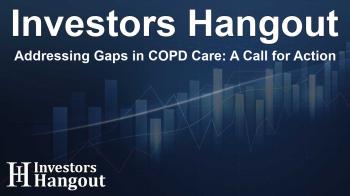Addressing Gaps in COPD Care: A Call for Action

Understanding the Current Challenges in COPD Care
The COPD Action Alliance calls for greater federal leadership, awareness campaigns, and insurance reform to improve care for 30 million Americans.
Chronic obstructive pulmonary disease (COPD) is a significant health concern affecting millions. Despite being recognized as the sixth leading cause of death in the country, many individuals still face substantial barriers to effective care and management. Recent discussions emphasize the necessity for robust federal attention to this public health crisis.
The Statistics That Matter
Research estimates that approximately 30 million Americans are living with COPD, accumulating direct medical costs exceeding $30 billion yearly. This staggering figure is expected to double within a few years. Individuals diagnosed with this chronic condition often incur annual medical expenses surpassing $4,000, highlighting the financial strain accompanying this disease.
The Global Perspective on Lung Health
Earlier this year, the World Health Organization made significant strides by adopting the Lung Health Resolution, which aims to tackle chronic respiratory disorders like COPD. By elevating this issue to a global health priority, there is hope for further developments. Yet, achieving meaningful progress requires proactive efforts to convert these commitments into tangible outcomes.
Insights from the COPD Action Alliance
According to Sarah Hoffman, the director of the COPD Action Alliance, it is essential that federal policymakers recognize the critical nature of COPD as a policy concern. She emphasizes the need for enhanced federal coordination, leading investments in research, and necessary insurance reforms. These reforms are crucial to ensure that individuals living with COPD have access to the latest treatments as they become available.
Key findings from their recent white paper include:
- Delayed Diagnosis: Alarmingly, about half of those suffering from COPD remain undiagnosed, limiting their treatment options and exacerbating health complications.
- Insurance Barriers: Approximately one-third of patients encounter obstacles, such as prior authorization and lack of coverage, that impede their access to essential care.
- At-Risk Populations: Certain groups, including veterans, first responders, and rural residents, are at a greater risk for COPD yet have limited access to healthcare resources.
- Stigma Associated with COPD: The disease's association with smoking creates a stigma that often prevents individuals, particularly non-smokers, from seeking help or reporting symptoms.
- Research Funding: Funding for COPD-related research is disproportionately low compared to the burden of mortality and prevalence it represents.
A Call to Action from the COPD Action Alliance
The COPD Action Alliance is urging swift, bold actions from federal policymakers to address these issues effectively. Their recommendations include:
- Implementing the NIH's National COPD Action Plan in full to establish a comprehensive approach to managing this disease.
- Increasing funding dedicated to research and educational outreach about COPD.
- Removing unnecessary insurance barriers such as prior authorization and step therapy, which hinder patient access to care.
- Expanding access to healthcare services for underserved and rural populations that often lack adequate resources.
- Establishing national standards for tracking progress and accountability in the management of COPD.
This collective call to action represents a significant effort to galvanize support for individuals impacted by COPD, ensuring they receive the care they deserve.
Frequently Asked Questions
What is COPD?
COPD, or chronic obstructive pulmonary disease, refers to a group of lung diseases that block airflow and make it difficult to breathe.
Who is affected by COPD?
Approximately 30 million Americans are diagnosed with COPD, including vulnerable groups like veterans and rural residents.
Why is early diagnosis important?
Early diagnosis can significantly improve treatment outcomes and help manage the disease effectively, avoiding severe health complications.
What are federal policymakers being urged to do?
The COPD Action Alliance is asking policymakers to implement the NIH’s National COPD Action Plan and to address insurance barriers.
How can citizens support COPD advocacy?
Citizens can support advocacy by raising awareness, participating in campaigns, and encouraging local representatives to prioritize COPD-related health measures.
About The Author
Contact Kelly Martin privately here. Or send an email with ATTN: Kelly Martin as the subject to contact@investorshangout.com.
About Investors Hangout
Investors Hangout is a leading online stock forum for financial discussion and learning, offering a wide range of free tools and resources. It draws in traders of all levels, who exchange market knowledge, investigate trading tactics, and keep an eye on industry developments in real time. Featuring financial articles, stock message boards, quotes, charts, company profiles, and live news updates. Through cooperative learning and a wealth of informational resources, it helps users from novices creating their first portfolios to experts honing their techniques. Join Investors Hangout today: https://investorshangout.com/
The content of this article is based on factual, publicly available information and does not represent legal, financial, or investment advice. Investors Hangout does not offer financial advice, and the author is not a licensed financial advisor. Consult a qualified advisor before making any financial or investment decisions based on this article. This article should not be considered advice to purchase, sell, or hold any securities or other investments. If any of the material provided here is inaccurate, please contact us for corrections.

